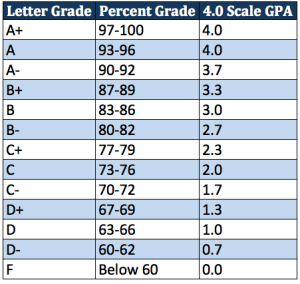If you were able to pick one quality to completely master in college, the smartest person in the room would choose time management. Because when you’re productive with your time, you operate on a high level and your life improves dramatically.
You’re able to accomplish more, feel happier because of it, and go through college with way less stress. It’s not that your life is perfect, but it’s nowhere near a chaotic disaster.
However, many college students’ lives are a mess because they have so much to do and don’t know how to find time to do it.
Ironically, it’s the people who don’t think they have time to read this blog post and learn time management strategies who actually need this the most.
Anyway, for those who know their schedule isn’t working and are looking for answers, you’re in the right place. Here are 7 time management strategies for college students.
1. Wake up when your alarm wakes up.
When your alarm goes off singing “beep, beep, beep,” you can choose to hit snooze or wake up ready to take on the day.
College students who make the most of their time decide to get up right away. They eat for energy and then start their to-do list.
The students who sleep in longer not only lose valuable time in their morning, but they also confuse their body which now doesn’t know if it’s time to wake up or sleep more. Then they feel sluggish the rest of the day where yawns and moments of dozing off are frequent.
Of course this damages their productivity and adds to their stress.
If you really want to push yourself in this area, take on the The 30-Day Challenge: Waking Up At 6 AM and see how it changes your life.
However, I’m not saying you have to wake up at 6 am or super early. Get seven to eight hours of sleep each night—you don’t need 10 hours—and then wake up the moment your alarm goes off.
2. Write down the major tasks this month in a planner.
With your extra time this morning since you didn’t hit snooze, you can set yourself up to succeed by writing down the big assignments and events this month in your planner.
If you don’t have a physical planner, you’re going to need it if you want to get the most out of your day. Organization is crucial for effective time management.
(I think Google Calendar can support your planner, but I find it more useful to write something down and cross it off when I’m finished than do the same on my laptop or phone.)
In your planner, begin by writing down the big assignments such as group projects, essays, and exam due dates. When you have these noted, you won’t ever face the dreaded thought of, “Wait, that’s due tomorrow!? I didn’t know.”
And you can add other important reminders to your planner like the date you’re going out of town and the day you need to schedule classes for next semester.
Plus, knowing the activities to look out for will help you with time management tip number 3—to plan out your week—and tip 4—plan out each day.
I wouldn’t plan more than a month out because things can change and due dates can get moved. Then it’d be a waste of time to erase or cross out what you wrote and redo it later.
3. Plan out your week.
Based off your big responsibilities this month, work backward and write down in your planner the specific activities you need to accomplish this week.
Don’t just write “English homework” in your planner. Instead write the specific assignment, like “Read 35 pages of Tolstoy and study for reading quiz.” This saves you from wasting brain energy and time to think of what the assignment is before you get started.
And since the best study method—The Chip Away Strategy—requires preparing a week in advance of the exam date, you should also keep in mind what you need to prepare for next week.
That’s why I like to give myself some stretch goals for the weekend, because I know each step I take will return an easier workload for me next week.
4. Plan each day.
I find it most effective to plan out your day the night before, but you can also do it in the morning if that works better for you. When you plan out your day, write a to-do list in your planner or on a post-it note and attach it to your laptop.
Complete your daily to-do list in the order of what’s most important to your future goals. So, although you might not feel like it, start the day by prioritizing your most important task first.
Of course, doing this gets you closer to reaching your long-term goal. But also, once you knock off your hardest or most important task, you’ll have positive momentum to finish the smaller activities and dominate your day.
If you can win each day like this, then you will win the week, the month, and the semester.
5. Make time to work out or relieve stress.
If you have a lot on your plate, it may seem like you don’t have time to work out or relax. But, I believe the crazier your schedule is, the more important it is you take time to exercise.
Exercise does an amazing job to refresh your body and mind. It gives you needed energy for the rest of the day. Not only that, the endorphins you gain from working out will make for a positive attitude you can carry on to your other activities. We know a positive attitude goes a long way when chasing success.
And it’s in your best interest to take breaks during the day anyway. So save yourself from burnout and make sure you finish the semester strong by staying healthy.
6. Take advantage of the small pockets of time.
Many students have the assumption that they need at least an hour to get something done. If they only have 30 minutes before their next class or student org meeting, they don’t believe getting productive in this time is worth it.
So they check social media, browse a random article, or sit outside their next class and daydream.
However, the people with the best time management skills realize that every small pocket of time can be useful in their day. If they have 30 minutes, 15 minutes, or even 10 minutes of spare time, they make the most of it to complete a homework problem or study for an exam.
And one or two short moments between classes is often enough to finish an entire homework assignment or write a page or two. These small pockets of time all add up, so don’t think you need a huge chunk of time to get started on something big or small.
7. Reward yourself for buckling down all week.
If you’re like me then you won’t like to admit this, but you’re human. And a grueling schedule where you feel like there aren’t enough hours in the day can drain anyone’s spirit.
So, after pushing yourself all week and working hard, give yourself something to look forward to Friday night or on the weekend.
Maybe this means a road trip to see a friend. Or you buy yourself a massage to enter complete relaxation. The point isn’t exactly what you reward yourself with, but that you give your mind space to unwind and relax each week.
Remember that your mental health and attitude is more important than any class grade or task.
And giving your brain some time to recover on the weekend is essential for when you start things over again on Monday.
Remain confident because you’ll get better as you go. Time management is definitely a learnable skill.
What was your favorite time management strategy on this list? What are some things you do to get more productive in college? Did I miss anything?




I use the todoist app as my todo list. It feels so rewarding to cross things off throughout the day until you’ve done them all. My friends give me a hard time about my to-do lists, but the lists help so much.
I 100% agree that crossing things off my to-do list feels so satisfying. And what’s better is it pushes me to cross more off to finish the day. And I would bet that you’re more productive than your friends.